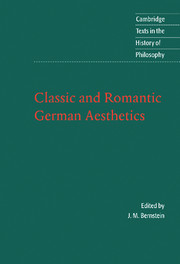Book contents
- Frontmatter
- Contents
- Introduction
- Chronology
- Further reading
- Note on the texts
- Aesthetica in nuce: A Rhapsody in Cabbalistic Prose (1762)
- Laocoön: An Essay on the Limits of Painting and Poetry (1766)
- From ‘On the Artistic Imitation of the Beautiful’ (1788)
- ‘Kallias or Concerning Beauty : Letters to Gottfried Körner’ (1793)
- ‘Oldest Programme for a System of German Idealism’ (1796)
- ‘Letter to Hegel, 26 January 1795’
- ‘Being Judgement Possibility’ (1795)
- ‘The Significance of Tragedy’ (1802)
- ‘Remarks on Oedipus’ (1803)
- From Miscellaneous Remarks (1797)
- ‘Monologue’
- ‘Dialogues’ (1798)
- ‘On Goethe’ (1798)
- ‘Studies in the Visual Arts’ (1799)
- From ‘Critical Fragments’ (1797)
- From ‘Athenaeum Fragments’ (1798)
- From ‘Ideas’ (1800)
- ‘On Goethe's Meister’ (1798)
- ‘Letter About the Novel’ (1799)
- ‘On Incomprehensibility’ (1800)
- Index
- Cambridge texts in the history of philosophy
From ‘Athenaeum Fragments’ (1798)
Published online by Cambridge University Press: 05 June 2012
- Frontmatter
- Contents
- Introduction
- Chronology
- Further reading
- Note on the texts
- Aesthetica in nuce: A Rhapsody in Cabbalistic Prose (1762)
- Laocoön: An Essay on the Limits of Painting and Poetry (1766)
- From ‘On the Artistic Imitation of the Beautiful’ (1788)
- ‘Kallias or Concerning Beauty : Letters to Gottfried Körner’ (1793)
- ‘Oldest Programme for a System of German Idealism’ (1796)
- ‘Letter to Hegel, 26 January 1795’
- ‘Being Judgement Possibility’ (1795)
- ‘The Significance of Tragedy’ (1802)
- ‘Remarks on Oedipus’ (1803)
- From Miscellaneous Remarks (1797)
- ‘Monologue’
- ‘Dialogues’ (1798)
- ‘On Goethe’ (1798)
- ‘Studies in the Visual Arts’ (1799)
- From ‘Critical Fragments’ (1797)
- From ‘Athenaeum Fragments’ (1798)
- From ‘Ideas’ (1800)
- ‘On Goethe's Meister’ (1798)
- ‘Letter About the Novel’ (1799)
- ‘On Incomprehensibility’ (1800)
- Index
- Cambridge texts in the history of philosophy
Summary
1. Nothing is more rarely the subject of philosophy than philosophy itself.
24. Many of the works of the ancients have become fragments. Many modern works are fragments as soon as they are written.
27. Most people are, like Leibniz's possible worlds, only equally rightful pretenders to existence. Few exist.
32. One should have wit, but not want to have it. Otherwise, you get persiflage, the Alexandrian style of wit.
35. A cynic should really have no possessions whatever: for a man's possessions, in a certain sense, actually possess him. The solution to this problem is to own possessions as if one didn't own them. But it's even more artistic and cynical not to own possessions as if one owned them.
37. Many witty ideas are like the sudden meeting of two friendly thoughts after a long separation.
39. Most thoughts are only the profiles of thoughts. They have to be turned around and synthesized with their antipodes. This is how many philosophical works acquire a considerable interest they would otherwise have lacked.
41. Those people who have made a profession of explaining Kant to us were either of the sort that lacked the capacity to gain an understanding for themselves of the subjects about which Kant has written; or else such people as had only the slight misfortune of understanding no one except themselves; or such as expressed themselves even more confusedly than he did.
43. Philosophy is still moving too much in a straight line; it's not yet cyclical enough.
44. Every philosophical review should simultaneously be a philosophy of reviews.
- Type
- Chapter
- Information
- Classic and Romantic German Aesthetics , pp. 246 - 260Publisher: Cambridge University PressPrint publication year: 2002
- 2
- Cited by

